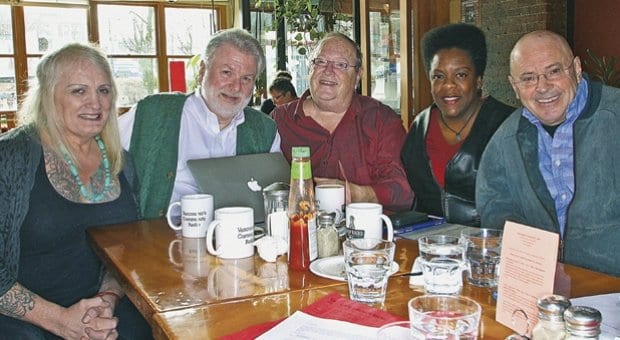It seemed such a simple idea. Assemble a few of the folks I consider friends and, over coffee, get them talking about the question of community and identity and the terms we use to identify ourselves.
I envisioned about an hour of comparing experiences before perhaps reaching a consensus on whether we still constitute a distinct community and, if so, what we are comfortable calling it.
The group I assembled included an aging gossip columnist (moi), an old-school gay liberationist from the 1970s (Gordon Hardy), a senior drag queen (Reg Manning), a leatherdyke (Kona), and a trans former sex worker and performance poet (Antonette Rea) ranging in age from our early 40s to early 70s.
How could we not agree?
Three hours later, having exhausted ourselves and our welcome at the café, we agreed on one important thing: that we need to keep talking.
We began by asking each other an identity question: “Are you queer?” There was certainly no consensus there.
“Definitely not!” was Reg’s table-thumping response. “It’s a negative word, there’s no good way of using it, and I don’t accept it.”
Gordon was also against the term “queer,” pointing out that it emerged from academic gender studies in the 1990s and is now used by a new generation of activists. “It’s not a term that’s been generally accepted in the community, no matter what queer activists might think.”
“Except maybe younger people,” Reg noted. “It has an edgy feel to it, and the young like to be edgy. They don’t know the history of the word’s use.”
“Queer was definitely seen as derogatory in the ’70s,” Gordon said, adding that, despite some reservations about imitating the American movement, Vancouver’s Gay Liberation Front preferred the word gay.
Kona took the wider view that queer and gay could both be useful: both say, “I’m not heterosexual” without opening doors to a lot of explanation.
“I’m not going to say I’m a leatherdyke in a casual conversation and then have to break that down for someone,” she said. “Queer is an entry point to establishing what I’m not.”
“Sometimes it’s just the shortest and most diplomatic route, the easiest thing to say that gives someone just enough information,” Gordon agreed.
Sometimes it’s more convenient to be “queer” or “gay” even if that doesn’t quite cover your own bases. “The gay community was the safest place for a trans person to be,” Antonette pointed out, “and being safe was more important than the names we were calling ourselves.”
We also read a letter sent by an Xtra reader in response to my earlier column introducing this discussion. He’s asked to remain anonymous for now but is happy to have his thoughts shared:
“I’m a bit younger than you and I have never liked the term queer. I think it may be empowering to use it amongst ourselves (maybe), but it is fundamentally a term of oppression. We need something aspirational and affirming for ourselves, but which also can be used with those outside our communities to build us up.”
And so we moved from the momentarily irresolvable question of what we should call ourselves as a community to the question of whether we are in fact a community — and, if so, whether we need to identify as a community and whether we need a physical place to call our community’s “centre.”
We agreed that, mostly for reasons of safety, our community, whatever we call ourselves, needs a place of its own.
And then, since we were hitting the three-hour mark and were all severely over-caffeinated, we agreed to table the discussion of what that should look like — and how it should be identified to create the biggest, safest comfort zone for the greatest number — until our next coffee date, which we heartily agreed to hold soon.
If this sounds a bit disjointed and all over the boards, well then you have a good sense of our conversation. To me the most important thing is that a group of people who come from distinctly different “tribes” of the “rainbow nation” are talking and listening.
Essentially, we’re just a group of queer/gay/lesbian/trans folks who have decided not to wait for the appropriate government-struck committee or applicable board of directors (bless them all) to tell us what they’ve decided. As Kona identifies herself, we could all be “community disorganizers” at large!
Next meeting we’ll try to narrow our focus a bit and drill down to some core questions that we’d like to hear addressed by our wider circles of friends. Then we’ll be asking you to come to coffee with us and continue the conversation.
Kevin Dale McKeown was Vancouver’s first out gay columnist, penning QQ Writes . . . Page 69 for the Georgia Straight through the early 1970s. Contact him at stillqq@dailyxtra.com.

 Why you can trust Xtra
Why you can trust Xtra


